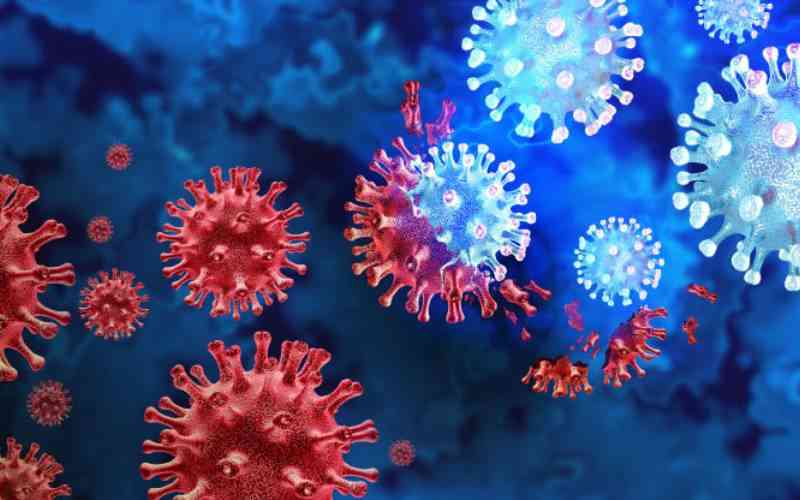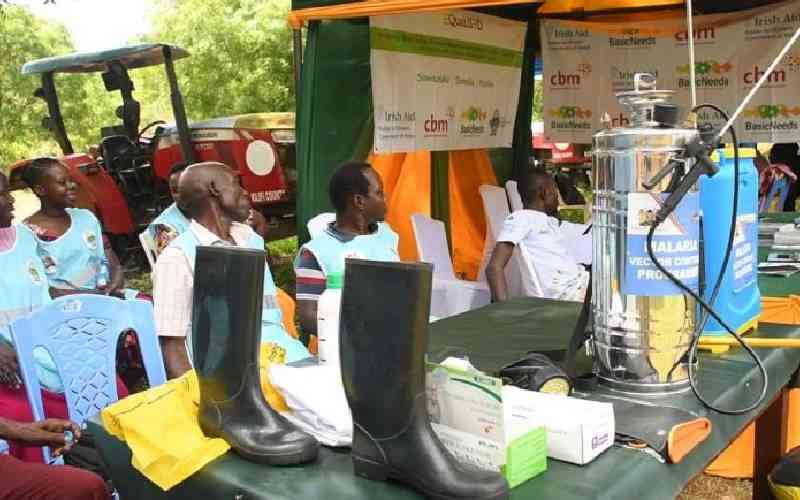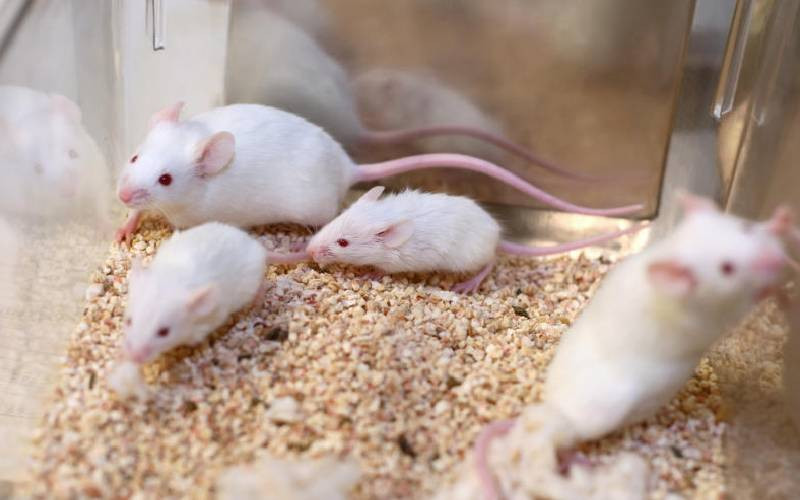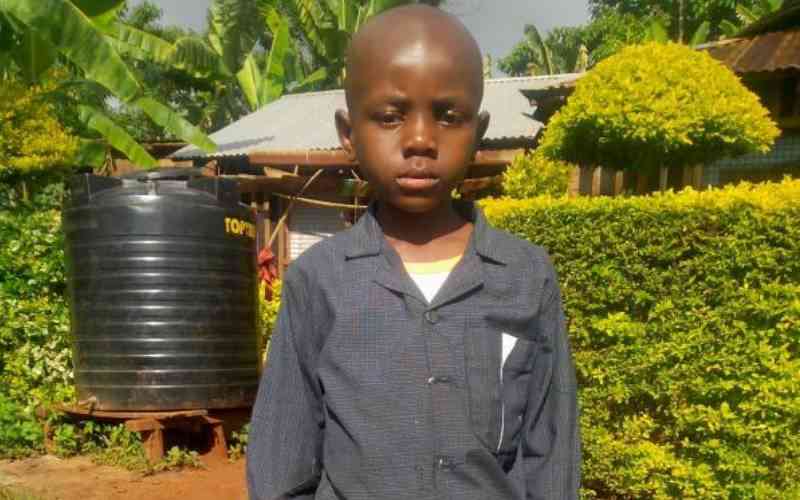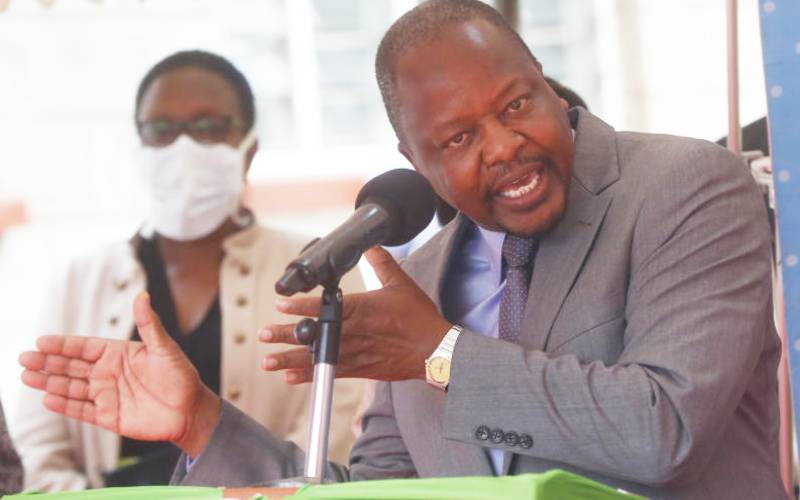
Health CS Mutahi Kagwe at Ainamoi Sub-County Hospital on August 10, 2020 when he toured the facility to assess the county's preparedness on Covid-19. [Kipsang Joseph,Standard]
When he landed at Afya House in early March through a Cabinet reshuffle, he cut the impression of a knight in a shining armour who would redeem the institution’s rotten image, for once in its troubled history.
Before that, Afya House, or Mafia House as it had come to be known, was the renowned citadel of graft cartels where well connected people minted money without breaking a sweat.
The American Wall Street Journal had described him Kenya’s “unlikely coronavirus hero” over his constant bulletins while Kenyans hailed him for his firmness, honesty and demeanor.
Five months later, however, the curve of his honour has been flattened by reports of graft in a key agency under his docket, with President Uhuru Kenyatta directing immediate investigations.
And it all went down as Kagwe threatened to cleanse the place through numerous transfers and warnings.
“This building has got its fair share of criminals. Like any other marketplace, there are a few mad cases in here. And we will unearth them. As we move on, we will unearth them,” he said at the close of May.
By April, the signs were ominous. An initial spat with a senior Kenya Medical Research Institute (Kemri) official betrayed the picture of a bullish CS who was keen on having things his way. But given the exigencies of the time, dealing with a novel virus and an anxious nation, Kenyans let him be.
When the ministry presented a breakdown of Sh1.8 billion budget featuring Sh4 million for tea, the uproar boomed all the way to Kagwe’s sixth floor corner office. Undeterred, the media savvy man with years of practice in public relations trade embraced the criticism while at the same time denying it.
“As a Kenyan, I too have been disappointed by leaders who fail us for reasons that span inefficiency to corruption. The allegations you are seeing are based on this trend: public skepticism and pessimism. I get it,” he wrote in a long social media rant.
He bemoaned an undisclosed “cohort” that he claimed believed in exploitation and that thinks that by spreading lies, innuendo and propaganda, he would be intimidated or make him lose the trust of those who believe in him.
“They want us sidetracked. I am no greenhorn; I have seen such mischief before, wasn’t intimated then and will not be intimidated now. Watch my actions, they will illustrate this.”
He proceeded to describe the budget analysis as fake, promised transparency while also swearing that there “will be no theft of Covid-19 resources” under his watch. This would become the trademark of Kagwe; admit, deny, blame, assure.
When civil society organisations like International Centre for Policy for Conflict (ICPC) raised doubts on Kenya’s strategy against the virus, calling it “blind and conflicted”, the MoH apparatus Kagwe commands, dismissed the doubts with contempt.
Failed prevention
The ICPC had complained of internecine wars among MoH key institutions – Kemri, National Influenza Centre (NIC) – as well as failure to involve counties.
“The national government was until the end of June 2020 obsessed with controlling and determining policy decisions with little or no consultation and coordination with county governments. Health is a devolved function,” ICPC wrote.
They also complained of failed prevention and mitigation efforts, and testing, which collapsed under the weight of disorganisation of the ministry and forced the country to always test less a day than the neighboring countries.
“The country is blindly fighting Covid-19. The national leadership has not figured out the virus. Kenyans must get ready to live with it,” ICPC Executive Director Ndung’u Wainaina said while releasing the report.
But Kagwe and his team trudged along, dismissing any criticism, until “Covid billionaires” exploded on live TV.
Again, Kagwe took to social media to address the allegations. In his style, he accepted the reportage while also faulting it, and throwing the challenge back at Kenyans.
“While it may have been marred by some inaccuracies (indeed we should never risk compromising a story’s credibility on account of questionable sources), the piece effectively offered you meaningful insights into the magnitude of our challenge,” he tweeted.
“It pleases me that you now have a deeper understanding of why I am so resolute about transforming the sector, and why I have implemented the changes you are witnessing. As I’ve repeatedly said, Kenyans deserve quality healthcare services and we must not allow its provision to be compromised…certainly not by graft.”
His constant refrain, however, has been that corruption was being weaponised and politicised.
And then last week, the details emerged, which put Kagwe and his Principal Secretary Susan Mochache in the spotlight. Emails tabled in Parliament shows the PS giving clear directions to now-suspended Kemsa Chief Executive Officer Jonah Manjari.
In a letter dated April 15, Mochache directed Manjari to procure Covid-19 related items worth Sh758 million. In the letter not copied to anyone, Mochache told the Kemsa boss to disregard any other directives he had been given prior to this.
“This is to approve the procurement of goods worth Sh758,690,583.25 as outlined in the attached annex. Disregard all other requests made in relation to Covid as they have been captured under this approval,” reads part of Mochache’s letter to Manjari.
Attached to the letter were annexures that showed the list of items to be procured, the unit price, the quantity and names of suppliers.
Call for resignation
For instance, six companies were to be given the tender to supply N95 face masks, where one company was to supply 1,000 pieces at a cost of Sh250 each while the another was to supply 10,000 pieces at a cost of Sh900 each despite the fact that they were of the same quality.
In another letter dated May 4, Mochache directs Manjari on the procurement and distribution of PCR tests and extraction kits and transport media for Covid-19 at a cost of Sh88.9 million.
Later on May 11, Mochache instructs Manjari to procure Abbott real-time Sars-COV-2 test kits at a cost of Sh365.9 million.
On Friday, Manjari blamed Kagwe, Mochache and a member of the Covid-19 Emergency Response Board for pressurising the agency. Yesterday, Kenya National Union of Nurses Secretary General Seth Panyako demanded Kagwe’s sacking.
Speaking in Kakamega, Panyako said sacking of the CS and other senior officials in the Health ministry is the only way the president would restore Kenyans’ confidence in his administration.
And in Machakos, Senator Boniface Kabaka urged Kagwe to resign with immediate effect if he was an honourable man.
 The Standard Group Plc is a multi-media organization with investments in media
platforms spanning newspaper print
operations, television, radio broadcasting, digital and online services. The
Standard Group is recognized as a
leading multi-media house in Kenya with a key influence in matters of national
and international interest.
The Standard Group Plc is a multi-media organization with investments in media
platforms spanning newspaper print
operations, television, radio broadcasting, digital and online services. The
Standard Group is recognized as a
leading multi-media house in Kenya with a key influence in matters of national
and international interest.

